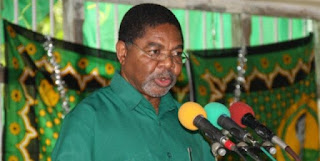ZANZIBAR marks the 53rd anniversary of the revolution today with President Ali Mohamed Shein expressing appreciation on progress attained in provision of social services to all since the ouster of the Omani-Arab sultanate oligarchy on January 12, 1964.
“The revolution has served its purpose; inequality that existed during the rule of sultan has been controlled. All Zanzibaris can now access social services equally,” Dr Shein remarked during an exclusive interview on private television station, Azam TV, on Wednesday.
Dr Shein, the seventh president of Zanzibar since the revolution, went on to praise the founding Father of Zanzibar, the late Sheikh Abeid Amani Karume, for steering the Indian archipelago to resounding development after the revolution.
“Zanzibaris suffered harassment and exploitation for long time before the revolution, which brought in a new era of life that enabled them to access education and health services,” Dr Shein said during the interview, which was hosted by veteran broadcaster Tido Mhando. He added that on top of all those mistreatments, the native people of Zanzibar were not even allowed to own land or conduct farming.”
President Shein, who is as well Chairman of the Zanzibar’s Revolutionary Council, described the revolution as the ‘symbol and icon’ of the Isles, pointing to the fact that it was not easy to liberate the islands from the sultan.
“We are very proud of the groundwork that was established by the founding president (the late Karume) and we will continue cherishing and preserving the revolution,” Dr Shein remarked. The Zanzibar’s president said successive governments in the islands have made major strides in the education sector where primary education is provided for free while parents are made to contribute some funds for students in secondary schools.
“By the time of the revolution in 1964 Zanzibar never had any higher institution of learning but we now boast of three universities,” Dr Shein stated in the televised interview.
He went on to explain on the progress attained in the health sector, whereby the islands now have 154 health facilities up from 36 in the past, noting, however, that there was still shortage of “specialised treatment at the hospitals.” On the other hand, President Shein welcomed both local and foreign investors in Zanzibar to work with the government through the Public and Private Partnerships (PPPs).
Tourism and cloves remain as Zanzibar’s main foreign exchange earner and President Shein was confident that the revised tourism policy will help retain a big chunk of proceeds from the industry.
“In the past, there were tourism agents who made all the bookings and payments abroad and as a result, the lion’s share of the proceeds remained there, leaving us with just a little, the new policy will change all this,” Dr Shein stressed.
Dr Shein noted as well that plans were underway to establish a commission to oversee the lucrative industry, which plays a crucial role in boosting the economy of Zanzibar. President Shein on the other hand took issues with government officials fond of frustrating investors wishing to undertake investments in Zanzibar through red tape.
“I am aware of the challenge and I will not tolerate these officials for their business as usual attitude,” President Shein warned. During the interview, Dr Shein also hailed Union President John Magufuli for his fight against corruption and misuse of public funds.
“Dr Magufuli’s sacking of inefficient and corrupt leaders is his style of leadership, but which complies with laws and regulations,” he noted. Regarding the union between Tanganyika and Zanzibar to form Tanzania, Dr Shein said almost all challenges facing the merger between the two had been resolved, stating that what remained was establishment of a Joint Monetary Commission. Meanwhile, ISSA YUSSUF reports from Zanzibar that President Shein has pardoned 14 prisoners as part of celebrations to mark 53 years of the revolution.
“Section 59 of the Zanzibar’s 1984 Constitution empowers the president to pardon prisoners,” a statement from the State House said, adding that it is a symbol of forgiveness as the country celebrates its liberation.
Those pardoned have served at least half of their sentences, with good behaviour and were not convicted of serious offences.
The freed inmates also include the elderly and those with serious health complications. The pardoning of prisoners is done normally during independence/ revolution celebrations to promote acceptable moral behaviour among inmates on both reformatory centres in the Isles and prisons on the Mainland.
source:www.dailynews.co.tz



















